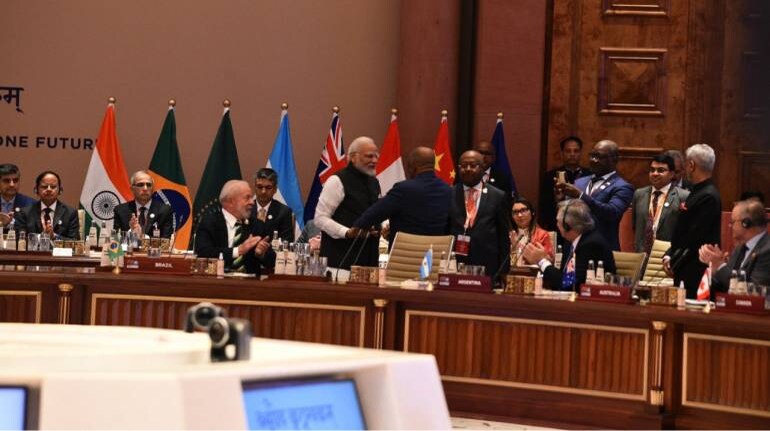
Highlights
After showcasing the country’s physical, cultural, and civilisational grandeur, along with its economic, scientific, and technological progress and dynamism in a year-long campaign, India harnessed its consensus-building skills at the G20 summit this weekend to adopt the New Delhi Leaders’ Declaration, driving agreement on more than 100 issues on the agenda, including the most contentious one, the Russia-Ukraine war.
Apprehensions reached a feverish pitch early last week that a consensus declaration may elude the G20 annual summit in New Delhi, particularly because of the purported vibes emanating from Moscow and Beijing. The absence of Russian President Vladimir Putin and Chinese supremo Xi Jinping at the summit further fuelled the anxiety.
New Delhi, however, took a multi-pronged approach to not only address the Russian and Chinese objections to the Ukraine conflict and other issues but also used the G20 platform to score a win in the game of one-upmanship with Beijing.
Besides helping the world leaders to bury the hatchet on the Ukraine conflict and put up a united front, India left its stamp of authority on the world stage by successfully lobbying for the inclusion of the African Union into the G20 and launching the Global Biofuels Alliance (GBA) to drive the development and deployment of these fuels across the world and position them as key to energy transition, while clinching a multi-country mega infrastructure deal to connect Asia with Europe via ports and railroads on the sidelines of the summit.
In the 83-paragraph New Delhi declaration, the India-led G20 called for coordinated steps to support the world economy that faces an uncertain outlook, along with expeditious and effective redressal of the debt vulnerabilities of low and middle-income countries. It also proposed scaling up inclusive action against climate change with a green development pact and sustainable development goals, put crypto-asset regulation on the global agenda, and committed to reforming multilateral development banks (MDBs).
“History has been created with the adoption of the New Delhi Leaders’ Declaration. United in consensus and spirit, we pledge to work collaboratively for a better, more prosperous, and harmonious future. My gratitude to all fellow G20 members for their support and cooperation,” Prime Minister Narendra Modi posted on X (formerly Twitter) after the 34-page declaration was adopted on Saturday (September 9).
While many of the issues discussed and deliberated at the New Delhi summit and penned in the declaration document have been dogging the world for quite some time now, two developments stand out as they underline India’s rising aspiration to emerge as the global leader of the developing world.
Take the case of the admission of the 55-nation African Union (AU) as a permanent member of the G20. Following its mantra of Vasudhaiva Kutumbakam, India had made the inclusion of the AU in the G20 a priority almost at the beginning of its presidency. As the voice of Africa, India’s lobbying for the AU can blunt some of the influence that China wields in the African continent. The AU’s membership of the G20 marks the biggest-ever inclusion of developing countries into a powerful grouping in a single stroke. This can pay dividends when an increasingly bold India steps up its bid for a permanent seat on the UN Security Council.
India’s campaign for the AU membership is also seen as New Delhi’s bid to counter Beijing’s initiative to expand the BRICS (Brazil, Russia, India, China, and South Africa) grouping. During the bloc’s summit in late August in Johannesburg, six nations — Argentina, Egypt, Ethiopia, Iran, Saudi Arabia, and the United Arab Emirates — were invited to join the BRICS from January next year.
Though India endorsed the move, experts feel that these countries will remain beholden to China for their inclusion as most of the heavy lifting to get them in was done by Beijing. India can expect similar allegiance from the African nations for their bloc’s G20 membership.
If the AU inclusion move is a subtle tactic in the India-China geopolitical rivalry, the India-Middle East-Europe Economic Corridor (IMEE EC) deal signed by India, the US, EU, Saudi Arabia, and the UAE, is an open challenge to China’s One Belt One Road (OBOR) initiative. The deal offers faster and cheaper sea and rail transit options to west Asia and Europe.
“This is a real big deal. I want to thank the PM (Modi). One Earth, One Family, One Future—that’s the focus of this G20 Summit. And, in many ways, it’s also the focus of this partnership that we’re talking about today. Building sustainable, resilient infrastructure, making quality infrastructure investments, and creating a better future... As we work to address infrastructure gaps across low-middle-income countries, we need to maximise the intensity of our investments,” US President Joe Biden said.
Though the details of this connectivity push are awaited, the new corridor is being presented as an alternative to China’s Belt and Road Initiative, which several countries in South Asia, the Middle East, and Africa have embraced.
While the resounding success of the Delhi Declaration, which is perhaps the strongest and most ambitious in the history of G20, firmly establishes India as a global force to reckon with, it betrays New Delhi’s eagerness to snatch the initiative away from Beijing to become the leading voice of the Global South.
Discover the latest business news, Sensex, and Nifty updates. Obtain Personal Finance insights, tax queries, and expert opinions on Moneycontrol or download the Moneycontrol App to stay updated!

Moneycontrol Pro Panorama | DPI, UPI, AI and finding a tech Neverland
Sep 8, 2023 / 02:38 PM IST
In this edition of Moneycontrol Pro Panorama: China's dam in Tibet proves costly for India, cries about AI safety gains momentum, ...
Read Now
Moneycontrol Pro Weekender: The road to 2047
Aug 12, 2023 / 10:56 AM IST
According to an RBI study, we need to grow real GDP by 7.6 percent per annum to be a developed economy. And that target is eminent...
Read Now